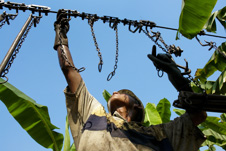
It often happens that you go to a place searching for one story, then find another which is much more interesting and decide that you are going to try to write that one instead. Right after you decide that, the new story turns into a monster, and you find that you can't give it up even when it drives you in debt and nearly refuses to be born.
In the Octopus piece, a U.S. multinational that every American child has heard of, paid millions of dollars to one of the most brutal right-wing militias in Colombia to solve its labor unrest problem through violence. Many Colombians lost their lives and the true human cost of this arrangement has not fully been recorded.
Chiquita brands, Inc. maintains that the millions they paid the right-wing militia was part of an extortion scheme and that they had no choice to protect their workers. It was a matter of safety. In the deal, the militia, called the Autodefensas, was given access to Chiquita's port at Turbo, a deal it immediately turned into a lucrative cocaine and arms smuggling operation. Tons of cocaine went out on Chiquita freighters, much of it bound for Europe, and thousands of small arms were unloaded at the Chiquita port. This was the heart of the drugs-weapons-violence cycle which caused so much bloodshed.
Salvatore Mancuso, the urbane leader of the Autodefensas, who I interviewed in prison in Medellin, explained that his group regularly used the cocaine to buy the arms. My other principal source, a young man who worked at the Chiquita docks for the militia during this time, said that Chiquita managers knew about the smuggling operations and said that included American Chiquita employees, gringos.
Salvatore Mancuso confirmed a great deal of this account in a long taped interview. It is also true that communist guerillas, the FARC and the ELN also played a large part in the violence, but this was not the focus of the story. It was interesting to unearth part of a U.S. corporation's involvement in a civil war through which it managed to greatly profit. Chiquita has never had to truly answer for its actions, nor has it ever been charged with complicity in murder and drug smuggling, but the truth of what happened remains and this cannot be erased. I still hold out hope that U.S. personnel who knew about the drug smuggling come forward with what they know so the victims' families can have a measure of peace.
Chiquita has since sold its fleet of freighters and no longer has its own operations in Colombia, preferring instead to work through a Colombian export organization, Banacol. After a "60 Minutes" television program aired with Salvatore Mancuso, President Alvaro Uribe signed an extradition order and allowed Mancuso to be transported to the United States to stand trial. The extradition was almost certainly retribution for speaking out and inserting himself into Colombian politics, a prospect that the President did not find useful. ![]()
 LEAD IMAGE: Aracataca, Colombia, 2007. A banana worker readies bananas for export. During the worst
of the violence in Northern Colombia, workers and labor organizers were targeted for assassination
by right-wing death squads connected to the banana industry.
LEAD IMAGE: Aracataca, Colombia, 2007. A banana worker readies bananas for export. During the worst
of the violence in Northern Colombia, workers and labor organizers were targeted for assassination
by right-wing death squads connected to the banana industry.Photo: Jan Sochor
© Phillip Robertson, 2009-2020.
